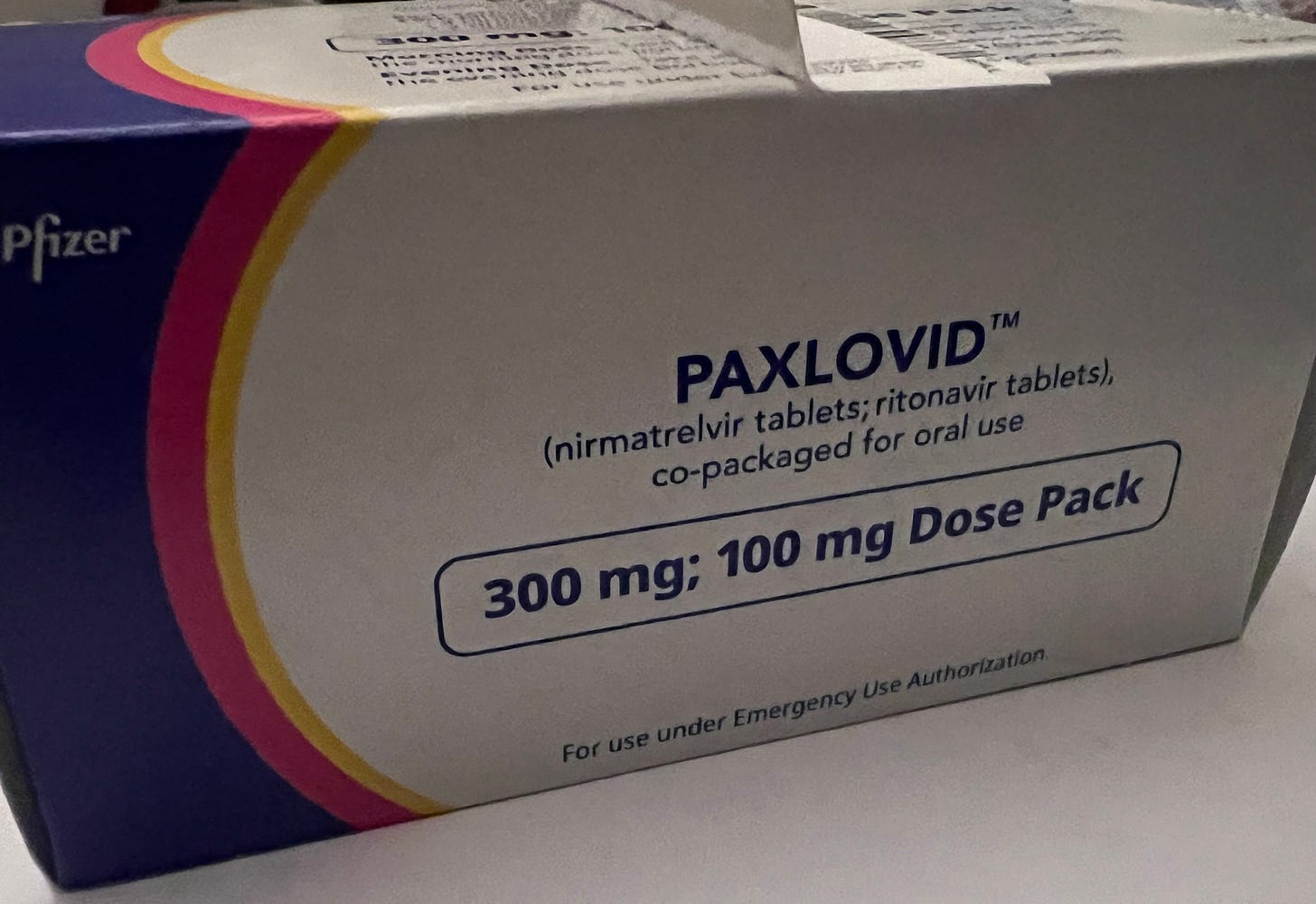Are You an Anti-Paxxer?
As doctors drop Paxlovid because of drug interactions and research shows it causes Covid rebounds and virus shedding, Pfizer and MSM crank the PR machine to hide the facts and shame "anti-paxxers."

When an article by Los Angeles Times metro reporter Rong-Gong Lin II recommended last month that practically everyone who tests positive for Covid takes Pfizer’s Paxlovid, some media veterans may have wondered what had become of the traditional wall between news reporting and advertising.
The story, which appeared on January 28, swept away almost all of the reservations that have been raised about the safety and effectiveness of this patent medicine, assuring us that “Paxlovid rebound” is a non-issue and fear of serious side effects is “erroneous.” It even went so far as to suggest that if your doctor won’t prescribe this “highly effective” medication, it’s time to go doctor shopping.
So why is this LA Times writer so desperately trying to sell us this fast-tracked antiviral that comes with a black box warning?
The article appeared at a particularly critical time for Pfizer just as it transitions from Emergency Use Authorization, or EUA Paxlovid, to FDA-approved Paxlovid. Originally free to patients, the medication was stockpiled by the U.S. government to the tune of 24 million treatment courses at a cost to taxpayers of $530 a box. Now, the FDA-approved version (same drug, different box) sells for a list price of up to $1,500. (According to an analysis by researchers at Harvard University, the actual cost to Pfizer for a five-day Paxlovid course is $13).
But to Pfizer’s chagrin, it now doesn’t seem to be able to even give the stuff away, let alone sell it at a premium price. Last fall Pfizer accepted a return of nearly 8 million boxes sent back by the U.S. government.
What’s a drugmaker to do when both patients and doctors shun a product that was anticipated to be the better half of Pfizer’s post-Covid “multibillion-dollar franchise?
Flush with all that Covid cash and new Paxlovid FDA approval last May, Pfizer went shopping for partners to help promote its products.
No stranger to top-tier PR firms such as Edelman and Ogilvy, the drugmaker tagged two of the biggest names in contemporary communications companies, Publicis Groupe, a Paris-based giant PR and ad agency, and the humongous Interpublic Group. These high-level agencies come at a big price tag, but what they can offer is priceless—a way to get your story told by respected media outlets.
That’s right, if you have enough money to hire the folks with all the right contacts, you too can create your own “news!” And these special contacts are something that PR firms, such as Edelman, are very proud of. Many agency hires, in fact, are recruited directly from major media outlets, such as Edelman NYC Brand Director Nancy Jeffrey, who spent a decade at the Wall Street Journal.
As quoted in an Edelman website blog, Jeffrey recalls how Richard Edelman (son of founder Dan) would call her during her time working at the paper “to meet a client with a story to tell.” As Jeffrey says, “No one at Edelman ever rises too high to pitch a reporter.”
So was our LA Times reporter “pitched,” or does he just have an evangelical connection with Paxlovid?
Let’s take a close look at his story and see what we find.
Side effects be gone!
First, there’s the article’s headline, which began: “If it’s COVID, Paxlovid”? Getting your oft-advertised product’s rhyming tagline in a headline—now that’s branding! And we don’t have to tell any of the side effects in this venue. The LA Times piece was off to a great start.
Why aren’t more people being given Paxlovid, the reporter wanted to know. It’s “cheap or even free for many,” he said. And then he delivered his first rave review, calling it “highly effective.”
By paragraph four, however, our intrepid reporter had uncovered the bad news that “a number of doctors are still declining to prescribe it.” But why? It must be those pesky “outdated arguments” about “Paxlovid rebound.” Anyone who gets Covid “has a similar rare chance of rebound,” he told us. For extra punch, he called on Dr. Peter Chin-Hong, professor of medicine at UCSF, to back up that statement. Rebound is “like, bogus” and “just dumb,” Chin-Hong said.
What Lin didn’t report is that a study published in the Annals of Internal Medicine in November 2023, by researchers from Mass General Brigham, found that in Covid patients taking Paxlovid, rebound was “much more common” and often without symptoms. Nearly 21 percent had virologic rebound versus under 2 percent not on the drug. Of perhaps even more significance, prolonged viral shedding for an average of fourteen days was noted in those who rebounded, indicating that they “were potentially still contagious for much longer.” The virologic rebound “phenomenon,” in Paxlovid patients, the authors noted, “has implications for post-N-R (Paxlovid) monitoring and isolation recommendations.” This study closely monitored patients with follow-ups three times a week “sometimes for months.”
After quoting from several Paxlovid-positive FDA and CDC statements and referencing a California Public Health commercial where people dance to an upbeat tune singing “Test it, treat it, beat it, California you know you need it,” Lin got around to some serious stuff—side effects.
Not mentioned by Lin, but good to know anyway, Paxlovid bears an FDA-required black-box warning about drug interactions, cautioning of “potentially severe, life-threatening, or fatal events.” But the article carefully danced around this inconvenient issue, simply mentioning that some Paxlovid takers may need to have their medications adjusted. The fear of “serious side effects . . . is largely erroneous,” it claimed.
Really?
“There are 125 drug interactions (for Paxlovid) across twenty-five different classes of medicines,” author and FLCCC President Dr. Pierre Kory said in a phone interview. “I’ve never used any medicine that had that number and degree of drug interactions, and I find it absurd,” added Kory, who is an expert in early Covid treatment.
And this is no secret. The Paxlovid package insert lists thirty-nine specific drugs that interact with this anti-viral (which is not a complete list, we’re warned) including medications that treat conditions such as an enlarged prostate, gout, migraines, high blood pressure, high cholesterol, arrhythmias, and angina.
With side effects out of the way, our reporter moved on to an interesting idea—doctor shopping.
If your doctor turns you down for Paxlovid, “what other options are there?” How about “reaching out to another healthcare provider” we’re advised, one “who might be more knowledgeable about Paxlovid . . .”
Don’t be an ‘Anti-Paxxer!’
The LA Times isn’t alone in this timely pushing of Paxlovid. The New York Times also ran a glowing Paxlovid piece at the beginning of January. The black-box warning was glossed over by simply saying that some “doctors balk” over the “long list of medications not to be mixed with Paxlovid,” referring to the drug as being “stunningly effective.” The NYT reporter also added five mentions of a study—actually a preprint (not yet peer reviewed or published)—which through the use of statistical magic concluded that during the course of the research had only half of the eligible Covid patients in the U.S. taken Paxlovid, 48,000 lives would have been saved.
The server where the research was posted warns journalists and others when discussing preprints to “emphasize it has yet to be evaluated by the medical community and information presented may be erroneous.”
Paxlovid is not the only drug that gets special treatment by the media. Last January, a 60 Minutes segment was called out by the Physicians Committee for Responsible Medicine as “an unlawful weight loss drug ad” for the med Wegovy. The piece, it noted, “looked like a news story, but it was effectively a drug ad,” the group said in a press release. PCRM also stated that Novo Nordisk, which makes Wegovy, paid over $100,000 to the doctors CBS interviewed for the segment.
With this new frenzy to sell Paxlovid, one can’t help but compare it to the campaign against ivermectin. Kicked off by the FDA in August 2021, it successfully branded this Nobel Prize-winning, FDA-approved drug as nothing more than a horse dewormer endorsed by fanatical outlier doctors and accepted by gullible patients. Despite being found to be an extremely safe treatment as well as an effective one for Covid, the FDA, CDC, and its media “partners” made ivermectin the subject of false accusations and warnings about the supposed risks of using it.
But early on in the game it was decided, as Dr. Kory pointed out, “to keep the market open for their novel pricey Paxlovid pill.” And to that effect, nothing was going to stand in the way. In an interview last summer with the head of the UCSF Department of Medicine, FDA Commissioner Dr. Robert Califf admitted that he helped promote Paxlovid—something he acknowledged is explicitly against the rules.
“In normal times, the FDA should not be a cheerleader . . .” Califf said. But since back then EUA drugs could not be advertised (a policy that changed in the fall of 2022) he went ahead and pitched it himself.
The Paxlovid campaign is far from over. In fact, it may now be revving up to full throttle. There’s even a name being bandied about for those who question the drug: “Anti-Paxxers.”
And if we can take any insight from the new Pfizer tagline (just filed for protection with the US Patent and Trademark Office), “Outdo Yesterday,” there are even more spurious strategies in its pharmaceutical pipeline.


No comments:
Post a Comment